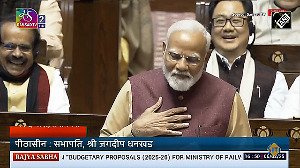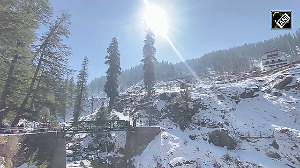Dinesh Parekh, president of the Thane-Belapur Industries Association testifies to a remarkable fact: "There have been no power cuts in the Thane Belapur belt."
The belt has the highest concentration of industry in the state. Vinod Garg, director (operations) at Ispat Industries too testifies to the same point: "Our steel plant at Dolvi has till date remained entirely unaffected by the power cuts in force. We have continued working at a normal pace without any loss of man-days."
Lending further support, a senior Bombay Dyeing executive says: "Our operations have not been affected. Intermittently, though, there has been the problem of poor quality power."
In a state that has five hours of power cuts every day in rural areas and three to four hours in urban areas (the duration of power cuts was raised on March 1), industry has escaped unscathed-so far. "The power cuts are not applicable to industry.
This is being done by using separate feeders for supplying power to residential and industrial consumers," a senior Maharashtra State Electricity Board functionary says. Mumbai and Navi Mumbai too are exempt from the power cuts.
MSEB, of course, is functioning on sound business principles, in a manner of speaking. It earns a revenue of about Rs 12,000 crore (Rs 120 billion) a year, but 55 per cent of it comes from industry. Industry in Maharashtra is charged a tariff of about Rs 4.50 per unit of power.
Most residential users pay roughly Rs 3 per unit. And MSEB charges farmers anywhere from 55 paise to Re 1 per unit. In effect, industry in Maharashtra subsidises farmers. So MSEB (and the state government) have been careful not to upset this cosy arrangement by cutting power to industrial units.
Maharashtra is in the grip of a power crisis and experiences a peak power shortage of 2,000 mega watts.The state's problems have been further compounded by the fact that it lost 740 mw of power from the Dabhol power project in May, 2001 after the squabbles between the state government and Enron began and after Enron finally collapsed.
If the second phase of the project had started operating (as had been planned) in December 2002, the state would have got a total of 2,184 mw of power from the project.
Sure, some companies complain that they are confronted with power problems. Says Bansilal Lunkad, a plastic manufacturer whose unit Bharat Plastics is located in H block of the Pune Maharashtra Industrial Development Corporation industrial belt: "Three days in a week we have to suffer load shedding of three hours each.
Then Thursday is designated as a stagnant holiday (no power). While the load shedding is of three hour durations on the three days, the machines used for our manufacturing process take two hours to heat up (after power is connected), effectively meaning that we suffer five hours of production stoppage thrice a week."
That's because the power supplied to the Pune MIDC is, oddly enough, from a residential feeder line.
Plastic units, ice factories and cold storages do face another problem. An MSEB notification issued in 1999 requires a unit to install a transformer on its premises if the connected load of the unit is above 67 high tension. Says Lunkad: "The cost of a transformer would be around Rs 400,000. Which small scale industrial unit can afford this additional cost?"
At Aurangabad's Waluj MIDC, Bharat Rajput, who owns Hira Polymers, grouses about power fluctuations. Says he: "Loadshedding is not an issue with us, apart from the weekly stagnant holiday. However, the fluctuations in the power supply impact us very badly since our production activity is of a continuous nature."
Maharashtra government has been trying to grapple with the power problem by sourcing additional power from the Power Trading Corporation and Tata Power Company, apart from imposing power cuts.
Still, MSEB officials say that the coming summer months could see some power cuts for industry too- but only in consultation with industry. And several private power company officials have suggested that the state's policy of high tariffs for industry have led to slower than expected industrial growth in the state.
While MSEB might have missed the woods for the trees, the paying customer is clearly king, for now.






 © 2025
© 2025